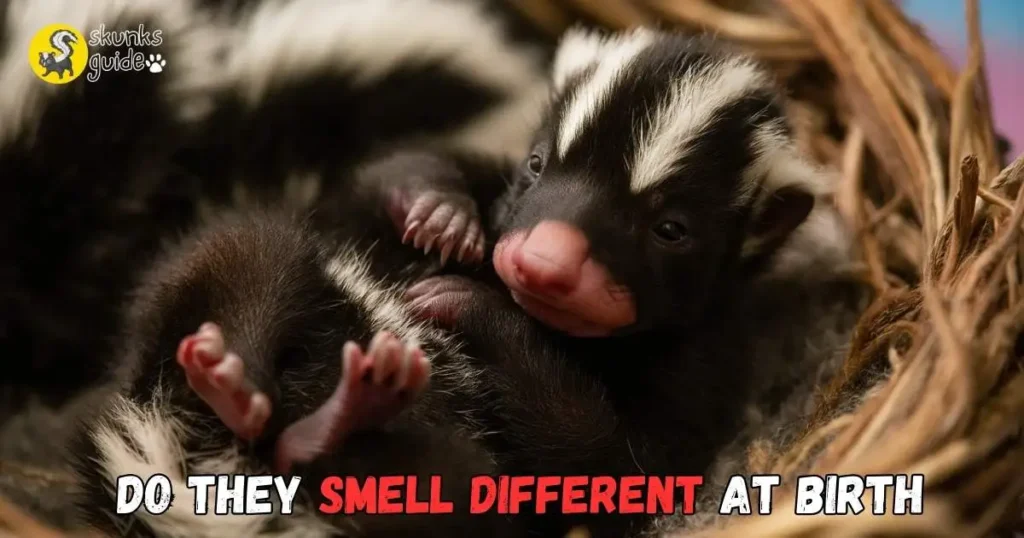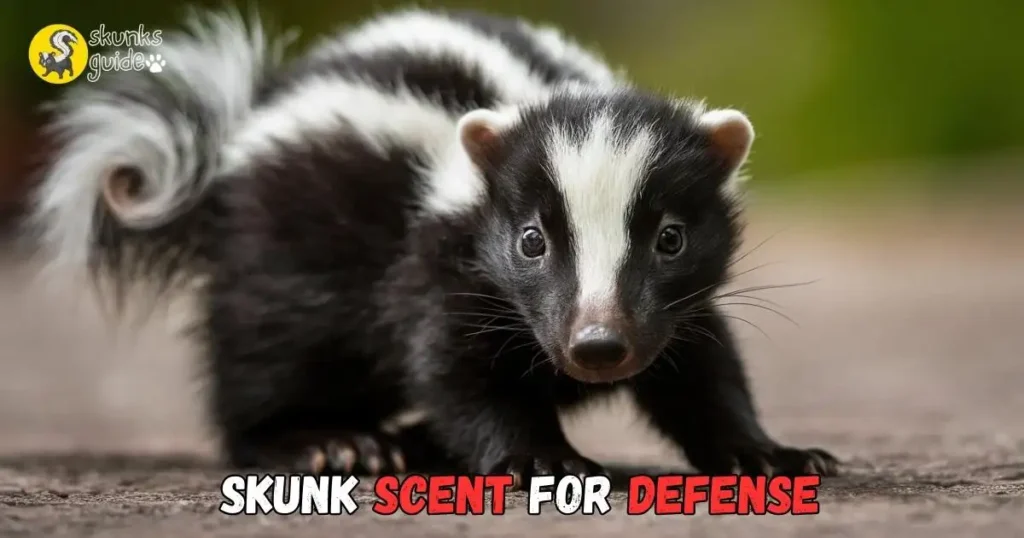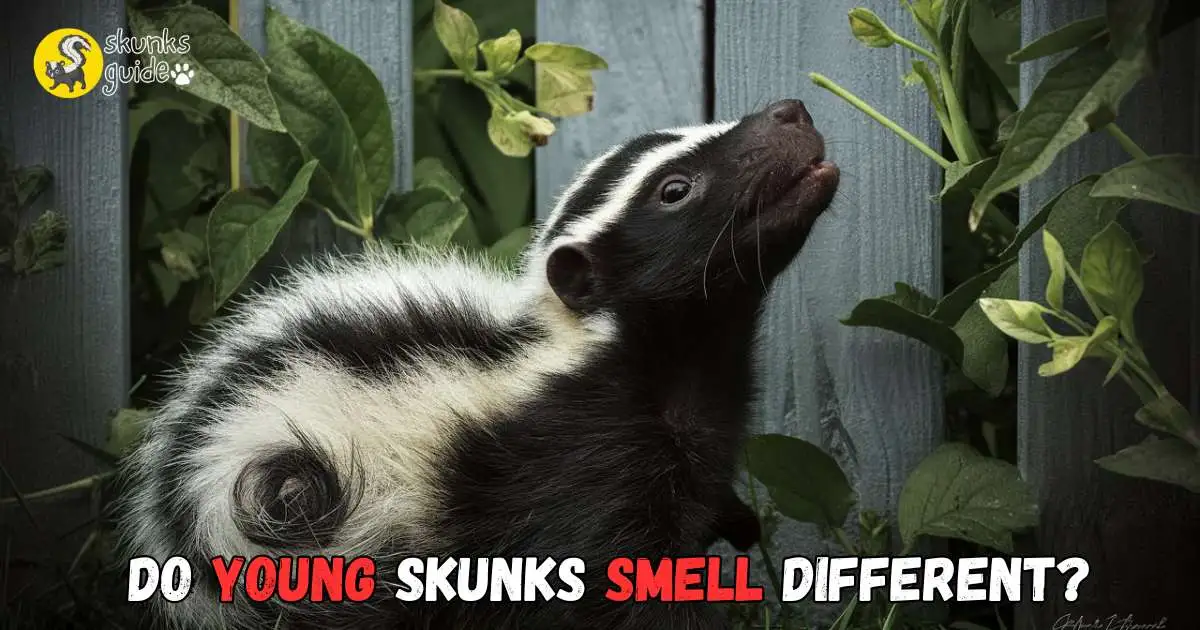Do Young Skunks Smell Different?
Yes, they do! Their smell isn’t as strong as adults, but it still packs a punch. After studying skunks in the wild, I’ve found that their scent changes as they grow older. If you’re curious about how and why this happens, stick around! There’s a lot to learn about these stinky yet interesting animals.
The Skunk’s Signature Scent
The smell of skunks is famous. This distinct odor comes from their defensive spray. Many wonder if young skunks smell different from adults. Understanding their scent can help answer this question.
Chemical Composition Of Skunk Spray
Skunk spray contains several chemicals. These chemicals are responsible for the unique smell. The main components include:
- Thiols: These sulfur-containing compounds give skunk spray its strong odor.
- Thioacetates: These are less potent but can convert to thiols.
- Butyric acid: This compound adds to the rancid smell.
Young skunks produce less spray. Their spray is also less concentrated. This means their scent may be milder. However, it can still be quite pungent.
Variations Across Species
Different skunk species have unique scents. Their sprays vary in chemical composition. Here are some examples:
| Skunk Species | Common Name | Odor Strength |
|---|---|---|
| Mephitis mephitis | Striped Skunk | Strong |
| Spilogale putorius | Spotted Skunk | Medium |
| Conepatus leuconotus | Hog-nosed Skunk | Weak |
Young skunks of each species may also vary. Their sprays may not match adults completely.
Birth Of A Skunk: Scentless Infancy?
Skunks are famous for their strong smell. But what about baby skunks? Do they smell different at birth? This section explores the early life of skunks and their scent development.

Early Development And Scent Glands
Baby skunks, also known as kits, are born blind and helpless. They rely on their mothers for everything. At birth, kits do not have fully developed scent glands.
- Kits are born in litters of 2 to 10.
- Their eyes open around 3 weeks old.
- They start to walk by 4 weeks.
During the first few weeks, kits are mostly scentless. Their bodies focus on growing and developing. The scent glands start to mature around 6 weeks.
When Do Skunks Start To Spray?
Skunks become capable of spraying between 6 to 8 weeks old. At this age, their scent glands are fully developed.
- First, they learn to use their glands.
- They practice during play with siblings.
- By 8 weeks, they can spray effectively.
Baby skunks often use their spray as a defense mechanism. It helps them protect themselves from predators. Understanding this process shows how skunks grow from scentless infants to smelly adults.
Age Matters: Scent Changes In Young Skunks
Understanding the scent of young skunks is fascinating. Their smells change as they grow. This section explores how age affects their odor.
Progression Of Scent Strength
Young skunks produce less strong smells than adults. Their scent glands are not fully developed. As they age, these glands mature, leading to stronger odors.
- Newborn skunks: Very little odor.
- Juvenile skunks: Mild scent, still less potent.
- Adult skunks: Powerful and pungent smell.
The change in scent strength occurs over time. Young skunks start with a faint odor. By maturity, their scent can be overwhelming.
Comparing Juvenile And Adult Skunk Odors
Juvenile skunks have a subtle scent. This makes them less noticeable in the wild. In contrast, adult skunks emit a strong and unique aroma. Their smell serves as a warning to predators.
| Age Group | Scent Description | Strength Level |
|---|---|---|
| Newborn | Minimal odor | 1/10 |
| Juvenile | Mild, less pungent | 4/10 |
| Adult | Strong, distinct | 10/10 |
These differences help skunks survive. Young skunks avoid detection with lighter scents. Adults rely on their powerful odors for protection.
Mythbusting: Do Baby Skunks Smell Sweeter?
Many people wonder if baby skunks have a different odor. The common belief is that young skunks smell sweeter. Let’s explore this myth and uncover the truth about skunk scent.
Common Misconceptions About Skunk Odor
- Baby skunks don’t spray at all.
- Young skunks have a pleasant smell like flowers.
- Skunks only smell bad when they are older.
These misconceptions lead to confusion. Baby skunks are often seen as cute and harmless. Yet, they can still produce a strong odor.
The Truth About Baby Skunk Scent
All skunks, regardless of age, can spray. Baby skunks are not different. Their spray may not be as potent, but it can still be strong.
Here are some important points to consider:
- Juvenile skunks can spray if threatened.
- Their scent glands develop early in life.
- Young skunks learn to control their spray as they grow.
In summary, baby skunks do not smell sweeter. They can emit a strong odor just like adults. Understanding this helps in appreciating these fascinating creatures.
Skunk Scent For Defense: A Survival Tool
Skunks are famous for their strong smell. This scent is not just a nuisance. It serves as a vital defense mechanism. Young skunks learn to use this tool early in life. Understanding their spray helps us appreciate their survival skills.

How Skunks Use Their Spray In The Wild
Skunks have special glands near their tails. These glands produce a potent spray. They can spray up to 10 feet away. Here’s how they use this defense:
- Warning: Skunks first warn predators with hissing sounds.
- Posturing: They may raise their tails and stomp their feet.
- Spraying: If threatened, they spray their pungent liquid.
This spray contains sulfur compounds. These compounds create a strong, unpleasant odor. It can linger for days. Young skunks learn to aim and control their spray effectively. This skill keeps them safe.
Effectiveness Against Predators
Skunk spray works well against many predators. Here’s a look at its effectiveness:
| Predator | Response to Skunk Spray |
|---|---|
| Coyotes | Often avoid skunks after one encounter. |
| Foxes | Tend to stay away once sprayed. |
| Bears | May be deterred by the strong smell. |
Skunks can spray multiple times. They need to feel threatened to use this tool. Their scent is a powerful survival strategy. Young skunks rely on it to escape danger.
Human Encounters: Dealing With Skunk Odor
Skunks are often misunderstood. Their famous spray can create big problems. Knowing how to handle skunk encounters is crucial. You can manage these situations effectively.
Tips For Managing Skunk Encounters
- Stay calm and keep your distance.
- Avoid sudden movements. Skunks may feel threatened.
- Do not approach a skunk. Give it space to escape.
- Keep pets on a leash. They might provoke the skunk.
- Close doors and windows to prevent odors from entering.
- Educate children about skunks. Teach them to respect wildlife.
Remedies For Skunk Spray
Getting rid of skunk odor is essential. Here are effective remedies:
| Ingredient | Instructions |
|---|---|
| Baking Soda | Mix with water to create a paste. Apply to affected areas. |
| Vinegar | Use a mixture of vinegar and water. Spray on the area. |
| Dish Soap | Combine with hydrogen peroxide. Wash the affected area. |
Follow these steps for best results:
- Act quickly. The sooner, the better.
- Wear gloves to protect your hands.
- Use multiple applications for stubborn odors.
- Air out the area. Open windows if possible.
Conservation Efforts: Protecting Skunk Populations
Skunks play a vital role in our ecosystem. Protecting their populations is crucial for balance. Various organizations work hard to ensure skunks thrive.
Skunks In The Ecosystem
Skunks are important for many reasons:
- Natural pest control: They eat insects and rodents.
- Soil aeration: Their digging helps improve soil quality.
- Food source: They provide nourishment for larger predators.
By maintaining skunk populations, we help keep the environment healthy. A balanced ecosystem supports all living things.
Current Conservation Status
Skunk populations face various threats:
| Threat | Impact on Skunks |
|---|---|
| Habitat loss | Reduces living space and resources. |
| Road accidents | Increases mortality rates. |
| Pollution | Affects their health and food sources. |
Many organizations focus on conservation efforts. They aim to protect skunks through:
- Creating safe habitats.
- Educating the public.
- Implementing wildlife corridors.
Understanding the importance of skunks helps motivate conservation actions. Every effort counts towards ensuring their survival.
Fascinating Skunk Facts And Oddities
Skunks are often misunderstood. They are not just famous for their smell. They have many unique traits and behaviors. Let’s explore some fascinating facts about these animals.
Unique Behaviors And Traits
Skunks have some surprising characteristics:
- Defense Mechanism: Skunks spray a foul-smelling liquid from their glands. This liquid can travel up to 10 feet!
- Coloration: Young skunks have stripes that may appear lighter. Their scent is often less potent than adults.
- Social Creatures: Skunks can be solitary but often share dens with family.
- Nocturnal Habits: They are mainly active at night. This helps them avoid predators.
Young skunks are curious and playful. They often engage in mock fights. This behavior helps them learn how to defend themselves.
Skunks In Popular Culture
Skunks appear in movies, cartoons, and folklore. They often symbolize mischief and fun. Here are some popular representations:
| Character | Source |
|---|---|
| Pepe Le Pew | Looney Tunes |
| Flower | Bambi |
| Stinky | Rugrats |
These characters show skunks as lovable and humorous. They help change the perception of real skunks. Skunks are much more than their smell.
Understanding skunks can lead to appreciation. Their unique traits make them special members of nature.
Frequently Asked Questions
Do Baby Skunks Smell Different Than Adults?
Baby skunks smell less potent than adults. Their scent glands are not fully developed, resulting in a milder odor. As they mature, the smell becomes stronger and more recognizable. Early exposure to their scent may help reduce its intensity later.
At What Age Do Skunks Stink?
Skunks can spray their distinctive odor as early as six to eight weeks old. By this age, they have developed the necessary glands. Young skunks may not spray often, but they can use their scent as a defense mechanism if threatened.
Do Some Skunks Smell Different?
Yes, some skunks can smell different due to diet, age, and species. Their scent varies, with some emitting a stronger odor than others. Factors like stress or illness can also alter their smell. Each skunk’s unique chemistry contributes to these differences.
Conclusion
Young skunks do have a different smell compared to adults. Their scent glands are not fully developed, leading to a milder odor. Understanding these differences can help in appreciating their unique characteristics. Observing young skunks offers a fascinating glimpse into their early life stages.
Embrace the curiosity and learn more about these intriguing creatures.

